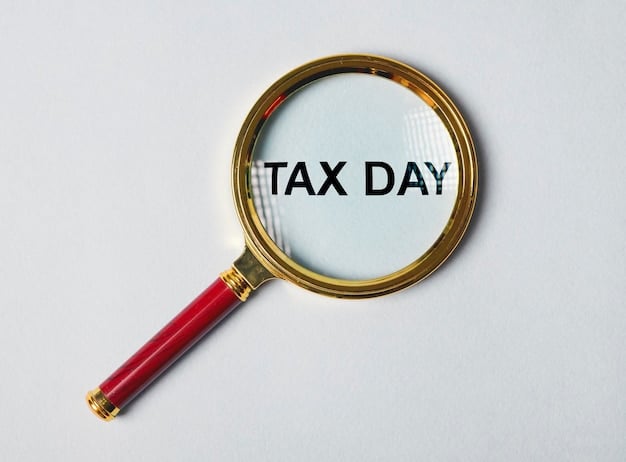Cashback and Taxes 2025: Reporting Rewards Simplified

Navigating the intersection of cashback rewards and tax obligations in 2025 requires understanding which rewards are taxable income and the specific reporting requirements for various types of cashback programs.
In an increasingly digitized economy, Cashback and Taxes: What You Need to Know About Reporting Your Rewards in 2025 has become a pertinent question for many consumers. While the allure of earning back a percentage of your spending is undeniable, understanding the tax implications of these rewards is crucial to stay compliant with federal regulations. This guide aims to clarify the complexities, separating taxable income from nontaxable rebates, and help you navigate your financial responsibilities confidently for the upcoming tax season.
understanding cashback rewards: income vs. rebates
Differentiating between various types of cashback rewards is the foundational step in determining their taxability. Not all cashback is created equal in the eyes of the IRS. Generally, cashback received as a reduction in the purchase price of an item is not considered taxable income, as it functions more like a discount or a rebate. However, rewards that can be interpreted as payment for services or as a bonus might fall under taxable income categories.
The distinction often hinges on whether the reward fundamentally reduces your cost or if it’s supplementary earnings. This nuance is critical for individuals and businesses alike, influencing how they should approach their financial records for the year 2025.
the rebate principle
Most credit card cashback programs operate on the rebate principle. When you use your credit card and earn cashback, it’s typically viewed as a reduction in the net cost of your purchases. The IRS generally considers these types of rewards as a price adjustment rather than income. For example, if you spend $100 and get $2 back, your effective cost was $98.
- Credit Card Cashback: Usually considered a discount on purchases, thus non-taxable.
- Rebates from Manufacturers: Direct price reductions after purchase, typically non-taxable.
- Retailer Promotions: Similar to discounts, often not taxable if tied directly to a purchase.
It’s important to keep clear records of your cashback earnings, even if they’re generally non-taxable. While not for reporting purposes, it helps in case of any IRS inquiry to demonstrate the nature of your rewards.
when cashback becomes taxable income
There are specific scenarios where cashback or similar rewards can be considered taxable income. These often involve situations where the reward isn’t directly tied to a purchase or where it’s disproportionately higher than the spending required, sometimes acting as an incentive for new accounts or deposits. For instance, bank account signup bonuses, even if marketed as “cashback,” are typically treated as taxable interest income.
Another area of consideration is rewards earned from business activities, such as cashback on purchases made for a business. These might need to be reported as an offset against business expenses rather than as a personal rebate. Understanding these distinctions is paramount for accurate tax filing.
When the reward functions more like payment for your participation or as a unique bonus not tied to actual spending price reduction, the IRS might consider it income. This includes things like referrals where you get paid for bringing in new customers, or certain bank account opening bonuses that aren’t technically interest. Always scrutinize the terms and conditions the financial institution provides.
common cashback scenarios and their tax implications
To further clarify the landscape of cashback and taxes, let’s explore common scenarios and their specific tax implications for the 2025 tax year. This will provide a practical understanding of how different types of rewards are treated under current tax law, helping you identify what needs to be reported and what does not.
credit card cashback rewards
The vast majority of credit card cashback rewards are considered non-taxable. This includes general cashback programs, specific category bonuses (e.g., 5% back on groceries), and even rotating category bonuses. The IRS views these as a reduction in the purchase price rather than a form of income. Therefore, you generally do not need to report these amounts on your tax return.
Even if you accumulate a significant amount of cashback over the year, as long as it originates from qualifying credit card spending, it usually falls under the non-taxable rebate category. This simplifies tax preparation for many savvy consumers who maximize their credit card rewards.
Always review the terms from your credit card issuer. Some cards might offer unique bonus structures that could blur the lines, but standard spending-based cashback remains tax-exempt in most cases.
bank account bonuses: checking and savings
Unlike credit card cashback, bonuses received for opening new checking or savings accounts are almost always taxable. The IRS typically considers these bonuses as interest income, even if they are not explicitly called “interest.” Banks and financial institutions are generally required to issue a Form 1099-INT for these bonuses if the amount is $10 or more. You will need to report this income on your tax return.
- Checking Account Bonuses: Taxable as interest income.
- Savings Account Bonuses: Taxable as interest income.
- Brokerage Account Bonuses: Often taxable; check the terms and any 1099 forms received.
It’s vital to closely examine any 1099-INT forms you receive from financial institutions. These forms clearly indicate the amount of income you need to report to the IRS, ensuring you meet your obligations for these types of rewards.

referral bonuses and other miscellaneous rewards
Referral bonuses, where you earn money for referring new customers to a service or product, often fall into a gray area or are considered taxable income. If you refer someone to a credit card and receive a bonus for it, that bonus might be taxable, especially if it’s not directly tied to your own spending on the card. Similarly, rewards from survey sites, sweepstakes, or other promotional activities not directly linked to a purchase price reduction are typically taxable.
The general rule of thumb for these miscellaneous rewards is: if it feels like you’re earning money without a corresponding purchase reduction, it’s probably taxable. This includes rewards from loyalty programs that are not direct purchase rebates, but rather a direct payment for participation, like signing up for an email list. Always keep documentation of the terms under which these rewards were earned.
The specific terms of the program are key. Some referral programs might be structured as a discount on future services, which would likely be non-taxable. Others might be a direct payment, which would then be taxable. When in doubt, consult the program’s terms and conditions or a tax professional.
reporting requirements: understanding form 1099
For taxable cashback and rewards, the reporting mechanism usually involves Form 1099. Understanding which specific 1099 forms you might receive is crucial for accurately filing your taxes. This section delves into the relevant 1099 forms and the thresholds that trigger their issuance, ensuring you are prepared for the 2025 tax season.
form 1099-int: interest income
Form 1099-INT is typically issued by banks and other financial institutions for interest income of $10 or more. As discussed, bank account bonuses are often categorized as interest and will be reported on this form. Even if you receive a bonus that isn’t explicitly called “interest,” if it’s from a bank account, it will likely appear on a 1099-INT.
When you receive a 1099-INT, the amount indicated needs to be reported on your tax return, usually on Schedule B (Interest and Ordinary Dividends) if you have over a certain amount of interest, or directly on Schedule 1 of Form 1040. Failure to report income shown on a 1099 form can lead to penalties and interest from the IRS.
It’s important to remember that banks are only required to send you a 1099-INT if the bonus is $10 or more. However, if the bonus is less than $10, it is still technically taxable income, and you are expected to report it, even without receiving a form.
form 1099-misc: miscellaneous income
Form 1099-MISC is used to report various types of miscellaneous income, including payments for services, rents, royalties, and certain prizes and awards. In the context of cashback and rewards, a 1099-MISC might be issued if you receive a bonus or reward that doesn’t fit neatly into the “interest” category but is still considered income. This could include certain referral bonuses, sign-up bonuses from non-banking entities, or large promotional winnings.
Generally, a 1099-MISC is issued if the amount of money earned is $600 or more from a single payer in a single tax year. If you receive one of these forms, the income must be reported on your tax return, typically on Schedule 1 (Additional Income and Adjustments to Income) of your Form 1040.
Carefully review the box on the 1099-MISC that indicates the type of income. This helps determine where exactly to report it on your tax return. If you suspect you should have received a 1099-MISC but haven’t, contact the payer directly.
form 1099-k: payment card and third party network transactions
While less common for typical cashback, Form 1099-K might become relevant if you are earning rewards through specific third-party payment networks or platforms that facilitate significant transactions. This form is primarily for tracking income from payment card and third-party network transactions, usually related to business activities. However, in limited circumstances, if a cashback program is structured in an unusual way, or if you are using a platform that pools and distributes rewards, you might receive a 1099-K.
For the 2025 tax year, the reporting threshold for 1099-K remains a topic of discussion and potential changes, but traditionally it applies to gross payments exceeding $20,000 and more than 200 transactions. It’s crucial to stay updated on any IRS guidance regarding this form, especially if you are involved in high-volume reward programs or affiliate marketing.
It’s highly unlikely that typical consumer cashback from credit cards would trigger a 1099-K. However, for those engaged in reselling or earning significant income through specific platforms, understanding its potential application is important.
strategies for managing taxable rewards
Once you’ve identified which of your cashback and rewards are taxable, the next step is to manage them effectively to ensure smooth tax filing. Proactive strategies can help you avoid surprises and maintain compliance. This involves diligent record-keeping, staying informed, and knowing when to seek professional advice.
diligent record-keeping
The cornerstone of managing taxable rewards is meticulous record-keeping. Even for rewards that are not taxable, retaining records can be beneficial in case the IRS has questions. For taxable rewards, keeping track of the source, amount, and date of each bonus is paramount. This includes saving documentation from the financial institution or company that issued the reward.
- Monthly Statements: Review and save statements that show earned bonuses.
- Terms and Conditions: Keep copies of the terms and conditions for any bonus offers, especially those that classify the reward as income.
- Digital Records: Maintain digital folders or spreadsheets to track all rewards received.
Good records not only help you accurately report income but also serve as important evidence if there’s ever a discrepancy with the information reported by the payer. This can prevent unnecessary back-and-forth with the IRS.
staying informed and proactive
Tax laws and IRS guidance can change, so it’s essential to stay informed about any updates regarding the tax treatment of cashback and rewards. Regularly checking the IRS website, reputable financial news sources, and tax professional blogs can help you stay current. Being proactive means not waiting until tax season to assess your rewards; instead, monitor them throughout the year.
Consider setting up reminders for yourself to review bonus terms when you sign up for new accounts or programs. If you’re involved in complex reward structures, a mid-year review of your earnings might also be beneficial for tax planning purposes. Proactivity can significantly reduce stress when tax season arrives.
Staying current with IRS publications and official announcements is the best way to ensure accurate compliance. Tax information is often updated, and overlooking a new rule could lead to errors in your filing.
tax consequences of non-compliance
Ignoring taxable cashback and rewards can lead to significant tax consequences. The IRS has sophisticated systems to cross-reference reported income with what external entities report (via 1099 forms). Non-compliance can result in penalties, interest, and even more severe legal repercussions in some cases. Understanding these potential outcomes underscores the importance of accurate reporting.
penalties and interest
If you fail to report taxable income from cashback or rewards, the IRS can impose penalties. These typically include:
- Failure-to-File Penalty: If you don’t file your return on time (5% of the unpaid taxes for each month or part of a month that a tax return is late, but the penalty is capped at 25% of your unpaid taxes).
- Failure-to-Pay Penalty: If you don’t pay the taxes you owe on time (0.5% of the unpaid taxes for each month or part of a month that taxes remain unpaid, also capped at 25%).
- Accuracy-Related Penalty: If you underreport income due to negligence or disregard for rules (20% of the underpayment).
In addition to penalties, the IRS will charge interest on any underpayments. This interest compounds daily, making it financially burdensome over time. It’s almost always more cost-effective to report all taxable income accurately and on time.
The IRS uses automated systems to match income reported on 1099 forms to your tax return. If there’s a mismatch, you’ll likely receive a CP2000 notice, which outlines the proposed changes to your tax liability. Responding promptly and accurately to such notices is crucial.
audits and legal ramifications
While less common for isolated instances of unreported small amounts of cashback, consistent failure to report taxable rewards or significant underreporting can trigger an IRS audit. An audit is a thorough review of your financial information to ensure compliance with tax laws, and it can be a lengthy and stressful process. If an audit reveals substantial unreported income or intentional tax evasion, more severe legal ramifications, including criminal charges, could follow.
The IRS aims to ensure fairness and compliance within the tax system. Demonstrating good faith and transparency in your tax filings, even for relatively small amounts of taxable rewards, is always the best approach to avoid these serious consequences and maintain a good standing with the tax authorities.
The best defense against an audit is a well-organized set of records and accurate reporting. If you do receive an audit notice, it’s highly advisable to seek professional tax representation to navigate the process effectively and protect your interests.

seeking professional tax advice
Given the nuances of tax law and the potential for changes, seeking professional tax advice is often the wisest course of action, especially if you have complex reward structures or significant amounts of taxable cashback. A qualified tax professional can provide personalized guidance and ensure full compliance.
when to consult a tax professional
You should consider consulting a tax professional if:
- You’ve received multiple types of rewards from various sources.
- You’re unsure about the taxability of a specific reward.
- You’ve engaged in business activities that generated cashback or similar rewards.
- You’ve received Forms 1099 (INT, MISC, K) that you don’t fully understand.
- Your total income, including rewards, puts you in a higher tax bracket or complex filing situation.
A professional can help you interpret tax documents, apply the latest tax laws, and identify any deductions or credits you might be eligible for, streamlining your tax preparation process. This expertise can save you time, stress, and potential penalties in the long run.
Even if your situation seems straightforward, a quick consultation with a tax professional can provide peace of mind and confirm that you’ve correctly interpreted the tax implications of your rewards.
benefits of professional guidance
The benefits of professional guidance extend beyond just accurate filing. A tax professional can offer strategic advice on optimizing your financial planning related to rewards, helping you understand how different reward structures might impact your overall tax liability. They can also represent you in case of an IRS inquiry or audit, providing an invaluable layer of protection.
Furthermore, tax professionals stay updated on new tax legislation and rulings, ensuring that your advice is always current. This expertise is particularly valuable in an evolving landscape where changes to reporting thresholds and income definitions can occur.
Investing in professional tax advice is an investment in your financial health and compliance, safeguarding you against potential errors and future complications. It’s a key component of responsible financial management in the context of modern rewards programs.
| Key Point | Brief Description |
|---|---|
| 💳 Credit Card Cashback | Generally non-taxable, viewed as a purchase discount. |
| 🏦 Bank Account Bonuses | Typically taxable as interest income; reported on Form 1099-INT. |
| 📝 Reporting Thresholds | $10 for 1099-INT (bank bonuses), $600 for 1099-MISC (misc. income). |
| 📚 Record Keeping | Essential for all rewards, especially for taxable income and IRS inquiries. |
frequently asked questions about cashback and taxes
▼
No, not all cashback rewards are taxable. Generally, cashback earned from credit card spending, which is considered a reduction in the purchase price, is not taxable. However, rewards like bank account opening bonuses or certain referral bonuses that aren’t tied to a purchase are typically considered taxable income.
▼
You may receive a tax form specifically for taxable rewards. For instance, bank account bonuses of $10 or more are usually reported on Form 1099-INT. Other miscellaneous taxable income over $600 might be reported on Form 1099-MISC. Non-taxable credit card cashback typically does not generate a tax form.
▼
Failing to report taxable cashback or rewards can lead to penalties and interest from the IRS. The IRS cross-references information reported by banks and other institutions with your tax return. Discrepancies can result in notices, proposed additional taxes, and in severe cases, audits or legal consequences.
▼
Most credit card sign-up bonuses that are directly tied to spending on the card and function as a discount on future purchases are generally not taxable. However, if a sign-up bonus is given as a direct cash payment without a spending requirement, it might be considered taxable income. Always check the specific terms and conditions of the offer.
▼
Yes, it is highly advisable to keep diligent records of all your cashback and reward earnings, regardless of their taxability status. This practice helps immensely if you need to clarify the nature of your rewards to the IRS or if you simply want to have a comprehensive overview of your financial gains throughout the year.
conclusion
Navigating the intersection of cashback and taxes requires careful attention to detail and an understanding of the nuances between taxable income and non-taxable rebates. As we approach the 2025 tax season, it’s clear that while many popular cashback programs remain tax-free as purchase price reductions, certain lucrative rewards, particularly those from banking institutions or miscellaneous bonuses, count as taxable income. Proactive record-keeping, staying informed on IRS guidelines, and knowing when to consult a tax professional are your best defenses against potential non-compliance. By taking these steps, you can confidently enjoy your hard-earned rewards while fulfilling your tax obligations responsibly.





